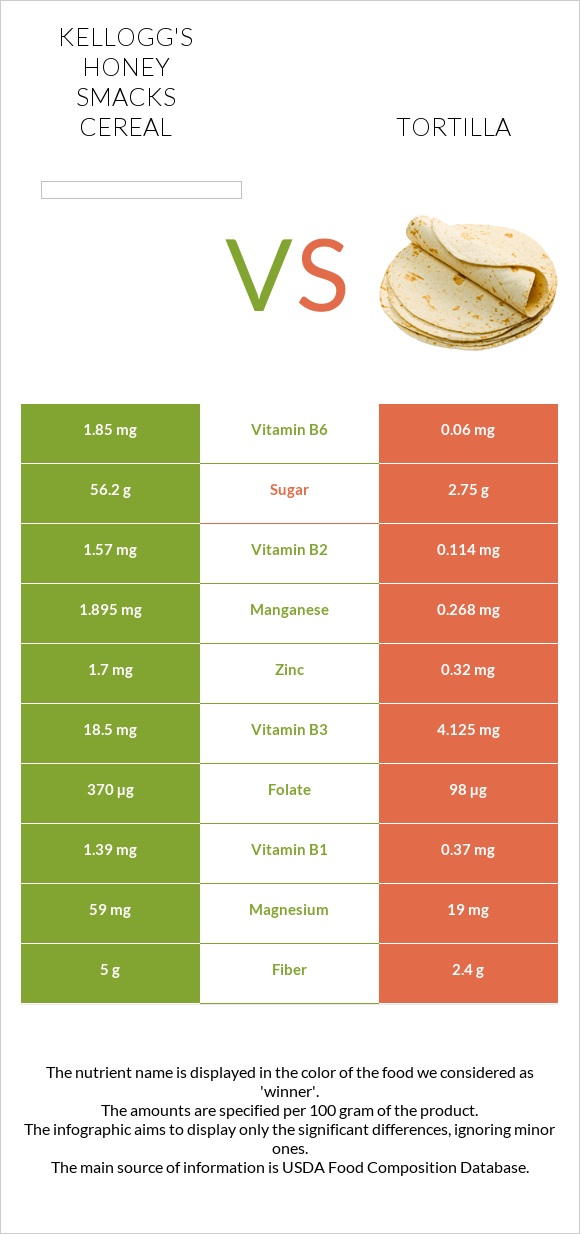Kellogg's Honey Smacks Cereal vs. Tortilla — In-Depth Nutrition Comparison
Compare
What are the main differences between kellogg's Honey Smacks Cereal and tortillas?
- Kellogg's Honey Smacks Cereal is richer in vitamin B12, vitamin B6, vitamin B2, vitamin B3, folate, vitamin B1, vitamin A, vitamin D, and vitamin C, yet tortillas are richer in calcium.
- Kellogg's Honey Smacks Cereal's daily need coverage for vitamin B12 is 233% higher.
- Tortillas have a lower glycemic index than kellogg's Honey Smacks Cereal.
We used Cereals ready-to-eat, KELLOGG, KELLOGG'S HONEY SMACKS and Tortillas, ready-to-bake or -fry, whole wheat types in this comparison.
Infographic

Infographic link
Mineral Comparison
Mineral comparison score is based on the number of minerals by which one or the other food is richer. The "coverage" charts below show how much of the daily needs can be covered by 300 grams of the food.
| Contains less SodiumSodium | -72.3% |
| Contains more ManganeseManganese | +∞% |
| Contains more MagnesiumMagnesium | +44.1% |
| Contains more CalciumCalcium | +1642.9% |
| Contains more PotassiumPotassium | +43.2% |
| Contains more IronIron | +75.3% |
| Contains more CopperCopper | +36.4% |
| Contains more ZincZinc | +12.9% |
| Contains more PhosphorusPhosphorus | +62.4% |
| Contains more SeleniumSelenium | +27.1% |
Vitamin Comparison
Vitamin comparison score is based on the number of vitamins by which one or the other food is richer. The "coverage" charts below show how much of the daily needs can be covered by 300 grams of the food.
| Contains more Vitamin CVitamin C | +∞% |
| Contains more Vitamin AVitamin A | +∞% |
| Contains more Vitamin DVitamin D | +∞% |
| Contains more Vitamin B1Vitamin B1 | +68.9% |
| Contains more Vitamin B2Vitamin B2 | +443.3% |
| Contains more Vitamin B3Vitamin B3 | +280.8% |
| Contains more Vitamin B6Vitamin B6 | +492.9% |
| Contains more Vitamin B12Vitamin B12 | +∞% |
| Contains more FolateFolate | +168.1% |
| Contains more Vitamin EVitamin E | +119.5% |
| Contains more Vitamin KVitamin K | +60.7% |
| Contains more CholineCholine | +28.2% |
All nutrients comparison - raw data values
| Nutrient |  |
 |
DV% diff. |
| Vitamin B12 | 5.6µg | 0µg | 233% |
| Vitamin B6 | 1.85mg | 0.312mg | 118% |
| Vitamin B2 | 1.57mg | 0.289mg | 99% |
| Vitamin B3 | 18.5mg | 4.858mg | 85% |
| Manganese | 1.895mg | 82% | |
| Vitamin A | 556µg | 0µg | 62% |
| Folate | 370µg | 138µg | 58% |
| Vitamin B1 | 1.39mg | 0.823mg | 47% |
| Vitamin C | 22mg | 0mg | 24% |
| Calcium | 14mg | 244mg | 23% |
| Saturated fat | 0.5g | 4.878g | 20% |
| Vitamin D | 3.7µg | 0µg | 19% |
| Phosphorus | 213mg | 346mg | 19% |
| Fiber | 5g | 9.8g | 19% |
| Vitamin D | 148IU | 0IU | 19% |
| Sodium | 142mg | 512mg | 16% |
| Iron | 1.5mg | 2.63mg | 14% |
| Carbs | 88.5g | 45.89g | 14% |
| Selenium | 29.1µg | 37µg | 14% |
| Fats | 2.2g | 9.76g | 12% |
| Copper | 0.195mg | 0.266mg | 8% |
| Protein | 5.7g | 9.76g | 8% |
| Monounsaturated fat | 0.4g | 3.062g | 7% |
| Magnesium | 59mg | 85mg | 6% |
| Calories | 380kcal | 310kcal | 4% |
| Polyunsaturated fat | 0.5g | 0.992g | 3% |
| Vitamin E | 0.41mg | 0.9mg | 3% |
| Zinc | 1.7mg | 1.92mg | 2% |
| Potassium | 183mg | 262mg | 2% |
| Vitamin K | 2.8µg | 4.5µg | 1% |
| Choline | 15.6mg | 20mg | 1% |
| Net carbs | 83.5g | 36.09g | N/A |
| Sugar | 56.2g | 2.44g | N/A |
| Trans fat | 0.5g | 0g | N/A |
| Tryptophan | 0.129mg | 0% | |
| Threonine | 0.312mg | 0% | |
| Isoleucine | 0.353mg | 0% | |
| Leucine | 0.671mg | 0% | |
| Lysine | 0.37mg | 0% | |
| Methionine | 0.163mg | 0% | |
| Phenylalanine | 0.488mg | 0% | |
| Valine | 0.444mg | 0% | |
| Histidine | 0.255mg | 0% |
Macronutrient Comparison
Macronutrient breakdown side-by-side comparison
Protein:
5.7 g
Fats:
2.2 g
Carbs:
88.5 g
Water:
2.9 g
Other:
0.7 g
Protein:
9.76 g
Fats:
9.76 g
Carbs:
45.89 g
Water:
30.15 g
Other:
4.44 g
| Contains more CarbsCarbs | +92.9% |
| Contains more ProteinProtein | +71.2% |
| Contains more FatsFats | +343.6% |
| Contains more WaterWater | +939.7% |
| Contains more OtherOther | +534.3% |
Fat Type Comparison
Fat type breakdown side-by-side comparison
Saturated fat:
Sat. Fat
0.5 g
Monounsaturated fat:
Mono. Fat
0.4 g
Polyunsaturated fat:
Poly. Fat
0.5 g
Saturated fat:
Sat. Fat
4.878 g
Monounsaturated fat:
Mono. Fat
3.062 g
Polyunsaturated fat:
Poly. Fat
0.992 g
| Contains less Sat. FatSaturated fat | -89.7% |
| Contains more Mono. FatMonounsaturated fat | +665.5% |
| Contains more Poly. FatPolyunsaturated fat | +98.4% |





